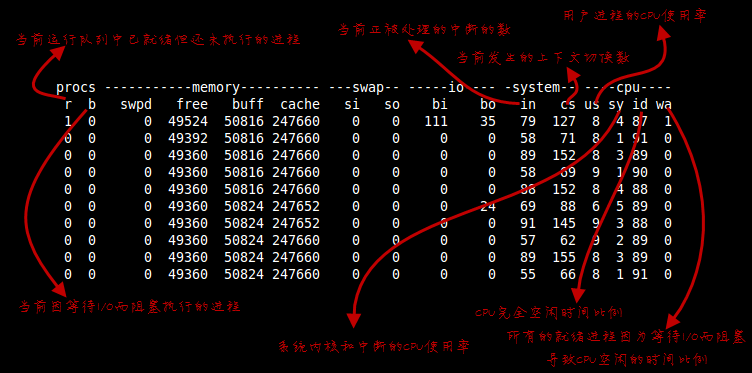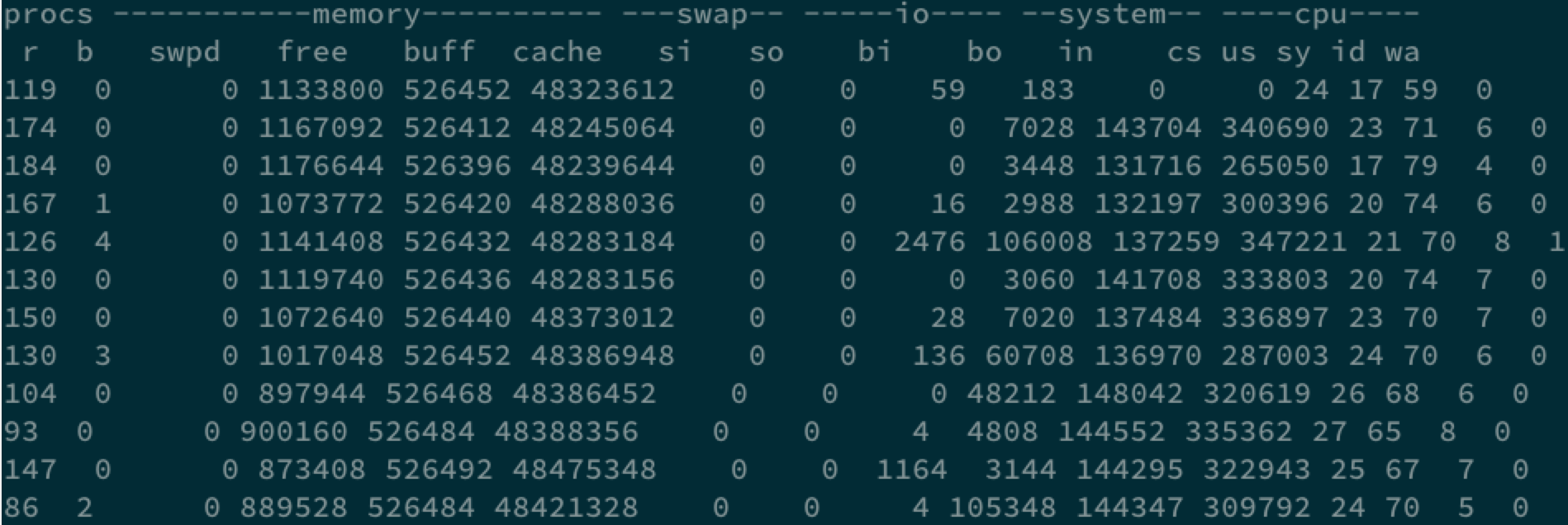最近值周遇到一个系统负载的问题,回溯了下问题大概已经持续了两个多月,这篇笔记记录下对于系统 CPU 负载的理解,不定期根据线上经历更新。
1. idle 与 load
idle 表示 cpu 的闲置程度,数值越大表示 cpu 负载越低。对应的,load average 表示 CPU 的利用率,系统记录了过去 1min/5min/15min 的记录。
通过 top 可以看到这两个数值:

更细的,可以看到每个 cpu 的 idle:

严格来讲,load average 是指运行队列的平均长度,也就是等待 cpu 的进程数。这些进程是系统中的活动进程,也就是处于 TASK_RUNNING or TASK_UNINTERRUPTIBLE 的进程数。
系统的进程状态有这么几种:
2. 飙高 load average 但 idle 正常
除了 TASK_RUNNING,我们可以使用 TASK_UNINTERRUPTIBLE 来模拟 load average 高的情况,写了一段测试代码:
#include <stdio.h>
#include <string>
#include <vector>
#include <thread>
void foo(const std::string& args) {
std::string contents;
for (int i = 0; i < 1024; ++i) {
contents.append("hello, world\n");
}
std::string file_name = "test_io";
file_name.append(args);
file_name.append(".data");
while (1) {
FILE* fp = fopen(file_name.data(), "w");
fwrite(contents.data(), contents.size(), 1, fp);
fclose(fp);
}
}
int main() {
std::vector<std::thread> threads;
const int cores_count = 1000000;
for (int i = 0; i < cores_count; ++i) {
threads.push_back(std::thread(foo, std::to_string(i)));
}
for (int i = 0; i < cores_count; ++i) {
threads[i].join();
}
return 0;
}
开启N多线程,都尝试去写文件,由于读写 hang 住时并不会消耗 cpu,当然调度太多线程也会使得 cpu 飙高。因此我们能够观察到 cpu 不那么高,但是 load average 飙到 2000+ 的场景:

因此,如果碰到 load average 飙高但 idle 正常的情况,注意观察是否有大量 IO 线程。
假设刚才编译出的二进制为 test_io
ps -eTo stat,pid,tid,ppid,comm | grep test_io | awk '{print $1}' | sort | uniq -c
2380 Dl+
5 Rl+
289 Sl+
可以看到有很多 D 进程.
3. Zombie 进程是否导致异常
线上情况当时有一个干扰因素,是存在大量的Z进程,但是按照第一节的解释,Z进程不会导致系统负载的两个指标异常,例如我们构造一个产生5000+Z进程的场景:
#include "unistd.h"
#include "stdio.h"
int main() {
for (int i = 0; i < 5000; ++i) {
pid_t child = fork();
if( child == -1 ) { //error
perror("\nfork child error.");
} else if(child == 0){
return 0;
}
}
sleep(1000);
return 0;
}

虽然存在 5000 zombie 进程,但系统负载和 idle 没有明显异常
4. average 和 idle 都很高的场景
这里记录了一个 load average 和 cpu 都很高的场景,跟我们理解的常识确实是相反的。
发现原因是所有进程都调度到了单独一个 cpu 上。
此时可以用 vmstat 确认下:

例如我当时看到的情况,比较明确是队列太多了
